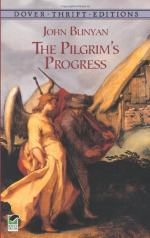{287} Well, towards evening, the Giant goes down into the dungeon again, to see if his prisoners had taken his counsel; but when he came there he found them alive; and truly, alive was all; for now, what for want of bread and water, and by reason of the wounds they received when he beat them, they could do little but breathe. But, I say, he found them alive; at which he fell into a grievous rage, and told them that, seeing they had disobeyed his counsel, it should be worse with them than if they had never been born.
{288} At this they trembled greatly, and I think that Christian fell into a swoon; but, coming a little to himself again, they renewed their discourse about the Giant’s counsel; and whether yet they had best to take it or no. Now Christian again seemed to be for doing it, but Hopeful made his second reply as followeth: —
{289} Hope. My brother, said he, rememberest thou not how valiant thou hast been heretofore? Apollyon could not crush thee, nor could all that thou didst hear, or see, or feel, in the Valley of the Shadow of Death. What hardship, terror, and amazement hast thou already gone through! And art thou now nothing but fear! Thou seest that I am in the dungeon with thee, a far weaker man by nature than thou art; also, this Giant has wounded me as well as thee, and hath also cut off the bread and water from my mouth; and with thee I mourn without the light. But let us exercise a little more patience; remember how thou playedst the man at Vanity Fair, and wast neither afraid of the chain, nor cage, nor yet of bloody death. Wherefore let us (at least to avoid the shame, that becomes not a Christian to be found in) bear up with patience as well as we can.
{290} Now, night being come again, and the Giant and his wife being in bed, she asked him concerning the prisoners, and if they had taken his counsel. To which he replied, They are sturdy rogues, they choose rather to bear all hardship, than to make away themselves. Then said she, Take them into the castle-yard to-morrow, and show them the bones and skulls of those that thou hast already despatched, and make them believe, ere a week comes to an end, thou also wilt tear them in pieces, as thou hast done their fellows before them.




